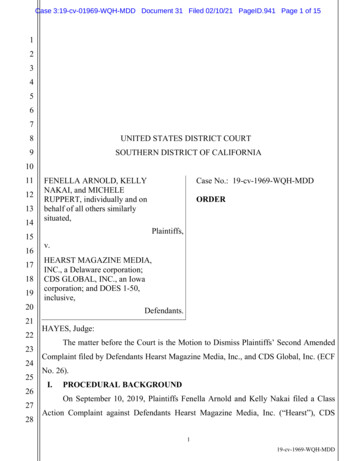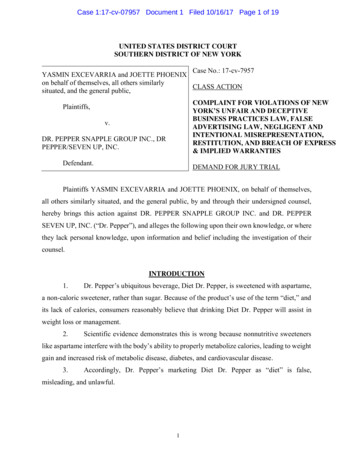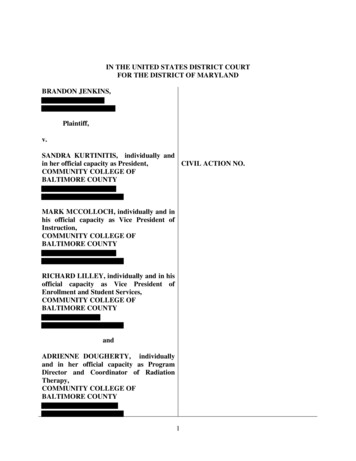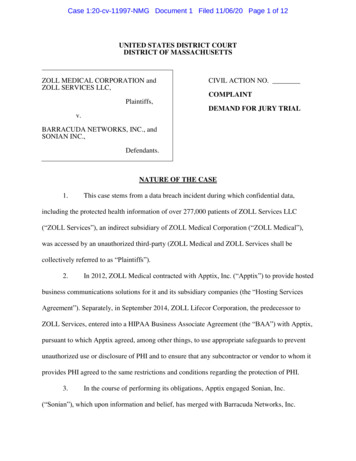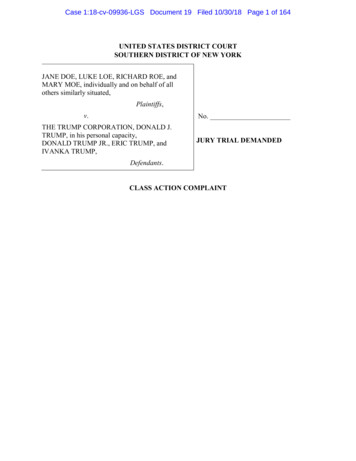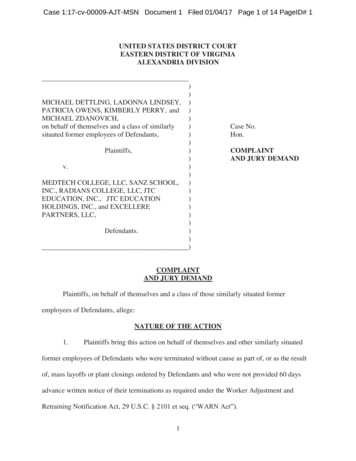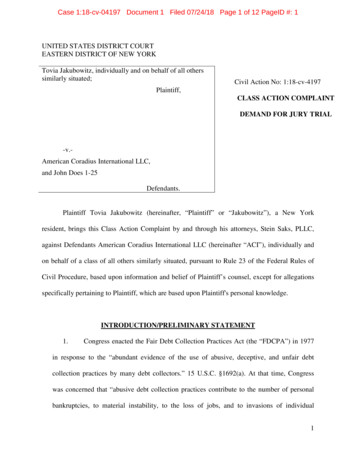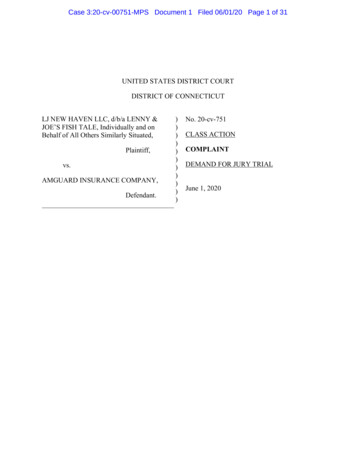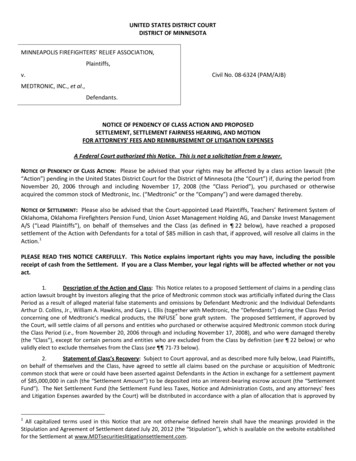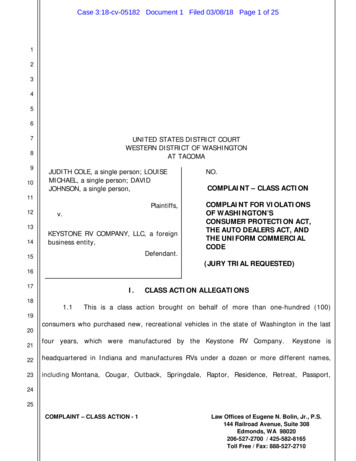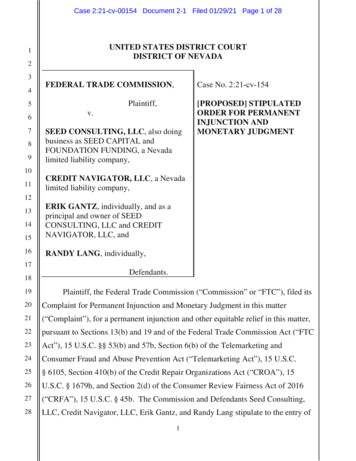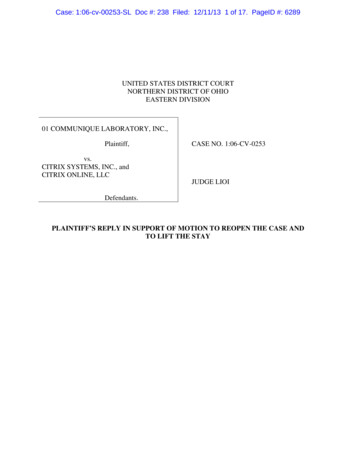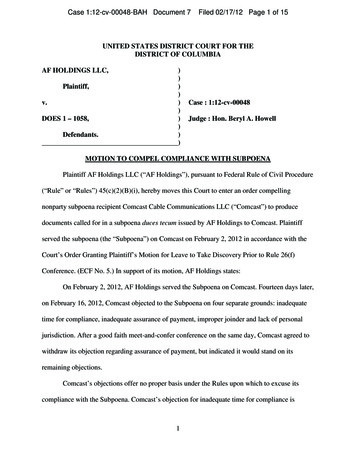
Transcription
Case 1:12-cv-00048-BAH Document 7Filed 02/17/12 Page 1 of 15UNITED STATES DISTRICT COURT FOR THEDISTRICT OF COLUMBIAAF HOLDINGS LLC,))Plaintiff,))v.))DOES 1 – 1058,))Defendants.))Case : 1:12-cv-00048Judge : Hon. Beryl A. HowellMOTION TO COMPEL COMPLIANCE WITH SUBPOENAPlaintiff AF Holdings LLC (“AF Holdings”), pursuant to Federal Rule of Civil Procedure(“Rule” or “Rules”) 45(c)(2)(B)(i), hereby moves this Court to enter an order compellingnonparty subpoena recipient Comcast Cable Communications LLC (“Comcast”) to producedocuments called for in a subpoena duces tecum issued by AF Holdings to Comcast. Plaintiffserved the subpoena (the “Subpoena”) on Comcast on February 2, 2012 in accordance with theCourt’s Order Granting Plaintiff’s Motion for Leave to Take Discovery Prior to Rule 26(f)Conference. (ECF No. 5.) In support of its motion, AF Holdings states:On February 2, 2012, AF Holdings served the Subpoena on Comcast. Fourteen days later,on February 16, 2012, Comcast objected to the Subpoena on four separate grounds: inadequatetime for compliance, inadequate assurance of payment, improper joinder and lack of personaljurisdiction. After a good faith meet-and-confer conference on the same day, Comcast agreed towithdraw its objection regarding assurance of payment, but indicated it would stand on itsremaining objections.Comcast’s objections offer no proper basis under the Rules upon which to excuse itscompliance with the Subpoena. Comcast’s objection for inadequate time for compliance is1
Case 1:12-cv-00048-BAH Document 7Filed 02/17/12 Page 2 of 15factually baseless. Further, nonparty Comcast’s concerns regarding personal jurisdiction andjoinder are not a legitimate basis for objecting to the Subpoean.As discussed in the attached memorandum of law, which is incorporated herein byreference, Comcast’s objections lack legal merit and factual support.Respectfully submitted,AF Holdings LLCDATED: February 17, 2012By: /s/ Paul A. DuffyPaul A. Duffy, Esq. (D.C. Bar Number: IL0014)Prenda Law Inc.161 N. Clark St., Suite 3200Chicago, IL 60601Telephone: (312) 880-9160Facsimile: (312) 893-5677E-mail: paduffy@wefightpiracy.comCounsel for the Plaintiff2
Case 1:12-cv-00048-BAH Document 7Filed 02/17/12 Page 3 of 15UNITED STATES DISTRICT COURT FOR THEDISTRICT OF COLUMBIAAF HOLDINGS LLC,))Plaintiff,))v.))DOES 1 – 1058,))Defendants.))Case : 1:12-cv-00048Judge : Hon. Beryl A. HowellMEMORANDUM OF LAW IN SUPPORT OFMOTION TO COMPEL COMPLIANCE WITH SUBPOENAPlaintiff AF Holdings LLC (“Plaintiff”) the owner of the copyrighted creative work atissue in this action, seeks to compel nonparty subpoena recipient, Comcast CableCommunications LLC (“Comcast”) to produce the documents called for in Plaintiff’s subpoenaduces tecum (“Subpoena”). (A true and correct copy of which is attached hereto as Exhibit A.)The Court should grant this motion because Comcast’s objections offer no proper basis under theFederal Rules of Civil Procedure upon which to excuse its compliance with the Subpoena.Moreover, Comcast’s objections lack legal merit and factual support.BACKGROUNDOn January 11, 2012, Plaintiff AF Holdings LLC brought a copyright infringement actionagainst unnamed defendants, alleging that the putative defendants illegally copied and distributedits copyrighted work to others over the Internet. (Compl., ECF No. 1.) Along with its Complaint,Plaintiff submitted an Exhibit of a list of ISPs and IP addresses associated with the infringingactivities. (Compl., Ex. A.) On January 18, 2012, Plaintiff moved for expedited discovery toobtain certain identifying information for the putative defendants. (Pl.’s Mot. for Leave to TakeDisc. Prior to Rule 26(f) Conference, ECF No. 4.)1
Case 1:12-cv-00048-BAH Document 7Filed 02/17/12 Page 4 of 15On January 30, 2012, The Court’s granted Plaintiff leave to issue subpoenas duces tecumto various Internet service providers (“ISPs”) for production of identifying information withrespect to the Internet protocol (“IP”) addresses of the putative defendants. (Order Granting Pl.’sMot. for Leave to Take Disc. Prior to Rule 26(f) Conference, ECF No. 5.) In accordance withthis Order, Plaintiff issued subpoenas to various ISPs, including Comcast. (Ex. A.) Fourteen (14)days later, on February 16, 2012, Comcast objected to Plaintiff’s subpoena on four independentgrounds. (A true and correct copy of which is attached hereto as Exhibit B.)Counsel for Plaintiff held a meet-and-confer conference via telephone with counsel forComcast on February 16, 2012. After good faith attempts to resolve their differences, the partieswere able to resolve one of Comcast’s objections—assurance of reimbursement for the cost ofproduction. This objection has been withdrawn. However, the parties were unable to reach anaccord with respect to Comcast’s three remaining objections or otherwise narrow the scope ofthese objections.Counsel for Comcast indicated in both its February 16, 2012 letter and during the meetand-confer that Comcast intended to produce no documents responsive to the Subpoena, and thatits objections were its only intended response. For the reasons set forth below, Comcast has notidentified a single valid basis to avoid compliance with the Subpoena. Plaintiff thereforerespectfully requests that this Court grant this motion to compel, and direct Comcast toimmediately produce any and all information within its possession, custody and control that isresponsive to the Subpoena.DISCUSSIONComcast’s opening objection is that there is no “valid court order that recognizes that [theCourt] will ultimately have jurisdiction over the unnamed subscribers.” (Ex. B. at 3.) Its nextobjection is that there is no valid court order regarding “whether [the unnamed subscribers] may2
Case 1:12-cv-00048-BAH Document 7Filed 02/17/12 Page 5 of 15be properly joined.” (Id.) Its final objection is that the subpoena may not provide for “areasonable time to fulfill any large order.” (Id.)Comcast recognizes that the “U.S. District Court for the District of Columbia has in thepast upheld certain subpoenas despite joinder and personal jurisdiction objections similar tothose we set forth below.” (Id. at 1.) Nevertheless, Comcast stated that, “[it] will not notify oursubscribers or produce documents or any other information identifying subscribers associatedwith the IP addresses in the Subpoena.” (Id. at 3.) For the reasons set forth herein, the Courtshould grant Plaintiff’s motion to compel Comcast’s compliance with the subpoena.a. Legal StandardFederal Rule of Civil Procedure (“Rule” or “Rules”) 45, among other things, sets forth anexhaustive list of grounds on which a subpoena may be quashed or modified:Rule 45(c)(3) Quashing or Modifying a Subpoena.(A) When Required. On timely motion, the issuing court must quash or modify asubpoena that:(i) fails to allow a reasonable time to comply;(ii) requires a person who is neither a party nor a party's officer to travel more than 100miles from where that person resides, is employed, or regularly transacts business inperson—except that, subject to Rule 45(c)(3)(B)(iii), the person may be commanded toattend a trial by traveling from any such place within the state where the trial is held;(iii) requires disclosure of privileged or other protected matter, if no exception orwaiver applies; or(iv) subjects a person to undue burden.(B) When Permitted. To protect a person subject to or affected by a subpoena, the issuingcourt may, on motion, quash or modify the subpoena if it requires:(i) disclosing a trade secret or other confidential research, development, or commercialinformation;(ii) disclosing an unretained expert's opinion or information that does not describespecific occurrences in dispute and results from the expert's study that was not requestedby a party; or3
Case 1:12-cv-00048-BAH Document 7Filed 02/17/12 Page 6 of 15(iii) a person who is neither a party nor a party's officer to incur substantial expense totravel more than 100 miles to attend trial.b. Comcast’s Personal Jurisdiction Objection is Erroneous and PrematureComcast objects on the basis that there is no “valid court order that recognizes that [theCourt] will ultimately have jurisdiction over the unnamed subscribers.” (Ex. B. at 3.) Comcast’spersonal jurisdiction objection is erroneous and premature.Comcast’s personal jurisdiction objection is erroneous because it suffers from at least twofatal procedural defects. First, personal jurisdiction objections do not fall on Rule 45’s list ofpermissible grounds for quashing or modifying a subpoena. See Fed. R. Civ. P. 45. The objectionshould be denied on this basis alone. Second, Comcast has no colorable basis for claimingstanding to challenge the Court’s exercise of personal jurisdiction over Comcast’s subscribers,who will have their own opportunity to object to personal jurisdiction at the appropriate stage ofthe litigation.Perhaps recognizing the fatal procedural defects associated with its opening objection,Comcast makes a tenuous attempt to link personal jurisdiction with the Communication Act’s“court order” requirement. 47 U.S.C. § 551(c). In essence, Comcast argues that theCommunications Act imposes on Comcast an obligation to confirm that the court orderauthorizing disclosure of its subscribers’ information contains a finding that the court wouldhave personal jurisdiction over the subscribers. This argument is entirely unsupported by theCommunications Act or any interpreting authority, including the Sony Music decision, whichinstead requires a copyright holder to make a prima facie showing of copyright infringementbefore revealing the identity of an anonymous copyright infringer. Sony Music Entm’t v. Does 140, 326 F. Supp. 2d 556 (S.D.N.Y. 2004). Comcast’s proposed finding regarding personaljurisdiction would be impossible to make at this stage of the litigation when the Court has limited4
Case 1:12-cv-00048-BAH Document 7Filed 02/17/12 Page 7 of 15means to assess personal jurisdiction. First Time Videos, LLC v. Does 1–76, No 11 C 3831, 2011WL 3586245, at *5 (N.D. Ill. Aug. 16, 2011) (Bucklo, J.) (“I lack sufficient information forevaluating jurisdictional defenses.”)Beyond these procedural defects, Comcast’s personal jurisdiction objection is premature.Comcast asks the Court to reach a preliminary finding on personal jurisdiction, ostensibly basedon the allegations contained in Plaintiff’s complaint. The Court should deny this request. SeeAnger v. Revco Drug Co., 791 F.2d 956 (D.C. Cir. 1986) (“[T]he Federal Rules of CivilProcedure indicate that personal jurisdiction is a matter to be raised by motion or responsivepleading, not by the court sua sponte.”)Plaintiff is not required to “prove” personal jurisdiction at this stage of the litigation. It iswell-established that personal jurisdiction does not even have to be pled. See, e.g., Hagen v. UHaul Co. of Tenn., 613 F. Supp. 2d 986, 1001 (W.D. Tenn. 2009) (“The burden of establishingthe existence of personal jurisdiction lies with the party asserting such jurisdiction, i.e. theplaintiff. Although, a plaintiff is only required to meet this burden when challenged by a motionunder Rule 12(b)(2) .”); Hansen v. Neumueller GmbH, 163 F.R.D. 471, 474-75 (D. Del. 1995)(noting Rule 8 does not require plaintiffs to state grounds on which personal jurisdiction isalleged and that the plaintiff’s pleading burden changes once the defendant challenges personaljurisdiction). Federal Rule of Civil Procedure 8(a)(2) requires only “a short plain statement of theclaim showing that the pleader is entitled to relief in order to give the defendant fair notice ofwhat the claim is and the grounds upon which it rests.” Bell Atl. Corp. v. Twombly, 550 U.S.544, 570 (2007). A defendant who:receives a complaint and summons from a court in anotherjurisdiction and believes she is not subject to that court’sjurisdiction has several alternatives available to her. First, shemay ignore the complaint and summons and then, if a default5
Case 1:12-cv-00048-BAH Document 7Filed 02/17/12 Page 8 of 15judgment is issued against her, may challenge the issuing court’sjurisdiction in a collateral proceeding (presumably closer to homeor other assets) when the plaintiff seeks to enforce the judgment.Second, she may voluntarily waive any lack of personaljurisdiction and submit to the district court’s jurisdiction. Third,she may appear in the distant court for the limited purpose ofdeciding the jurisdictional issue.Ellis v. Fortune Seas Ltd., 175 F.R.D. 308, 311 (S.D. Ind. 1997). Only if the third scenariopresents itself would the Court have cause to address personal jurisdiction. Id.At this stage of the litigation, no defendant has been named or served with process.Accordingly, the Court is not exercising jurisdiction over any defendant and discussion ofpersonal jurisdiction is premature. The Court has previously issued an authoritative decision onthis issue. Call of the Wild Movie, LLC v. Does 1–1,062, 770 F. Supp. 2d 332 (D.D.C. 2011).The Court’s decision followed and developed existing persuasive authority. See, e.g., AristaRecords, LLC v. Does 1–19, 551 F. Supp. 2d 1, 11 (D.D.C. 2008) (Kollar-Kotelly, J.); LondonSire Records, Inc. v. Doe 1, 542 F. Supp. 2d 153, 161 & n.7, 180–81 (D. Mass. 2008); SonyMusic Entm’t, Inc. v. Does 1–40, 326 F. Supp. 2d 556, 567–68 (S.D.N.Y. 2004).Furthermore, the Court’s decision in Call of the Wild has been repeatedly reaffirmed bythe Court, as well as by the Court’s esteemed colleagues within the District Court for the Districtof Columbia. See, e.g., Order, Imperial Enters. Inc. v. Does 1–3,145, No. 11-529 (RBW) (D.D.C.Aug. 30, 2011), ECF No. 43 at *3–5, 8 (Walton, J.); W. Coast Prod., Inc. v. Does 1–5,829, No.11-57 (CKK), 2011 WL 2292239, at *5 (D.D.C. June 10, 2011) (Kollar-Kotelly, J.); DonkeyballMovie, LLC v. Does 1–171, No. 10-1520 (BAH), F. Supp. 2d , 2011 WL 1807452, at*4–9 (D.D.C. May 12, 2011) (Howell, J.); Voltage Pictures, LLC v. Does 1–5.000, No. 10-0873(BAH), F. Supp. 2d. , 2011 WL 1807438, at *4–9 (D.D.C. May 12, 2011) (Howell,J.)6
Case 1:12-cv-00048-BAH Document 7Filed 02/17/12 Page 9 of 15Similarly, the Call of the Wild decision has influenced federal courts across the nation,which have affirmed and followed its principles and reasoning. Order Den. Doe Defs.’ Mot. toQuash, Hard Drive Productions, Inc. v. Does 1-118, No. 11-1567 (N.D. Cal. Nov. 8, 2011), ECFNo. 28 at 3:22–4:8 (“[A] a court cannot assess whether personal jurisdiction exists over aparticular defendant until the defendant has been identified.”); Order, Hard Drive Productions,Inc. v. Does 1-31, No. 11-22206 (S.D. Fla. Oct. 24, 2011), ECF No. 25 at 5 (finding personaljurisdiction argument “unavailing and premature” because “it remains unclear whether thisindividual is a party to the litigation” and “the Court lacks sufficient information at this stage ofthe proceedings”); Order, Hard Drive Productions, Inc. v. John Does 1–44, No. 11-2828 (N.D.Ill. Aug. 9, 2011), ECF No. 15 at 2 (Holderman, C.J.) (“[Movant] has not yet been named as adefendant in this case, nor has he been served with process pursuant to Rule 4. Unless and until[movant] has been officially brought into this case, the question of personal jurisdiction remainsunripe for resolution by the court.”)c. Comcast’s Joinder Objection is Erroneous and UnavailingComcast objects on the basis that there is no valid court order regarding “whether [theunnamed subscribers] may be properly joined.” (Ex. B at 3.) According to the objection letter,Comcast apparently believes that the jurisprudence of the overwhelming majority of federalcourts nationwide is—in its personal view—“unpersuasive.” (Id. at 4.) (“[Y]our argument thatthe Doe Defendants acted in concert is unpersuasive.”) Comcast’s joinder objection is erroneousand premature.Comcast’s joinder argument is erroneous because it suffers from at least two fatalprocedural defects. First, joinder objections do not fall on Rule 45’s list of permissible groundsfor quashing or modifying a subpoena. See Fed. R. Civ. P. 45. The objection should be denied on7
Case 1:12-cv-00048-BAH Document 7Filed 02/17/12 Page 10 of 15this basis alone. Second, Comcast has no colorable basis for claiming standing to challengepermissive joinder in an action to which it is not a party. Finally, Comcast once again makes atenuous attempt to link its joinder objection to its responsibilities under the Communications Act.(Ex. B. at 3.) This attempt fails for the reasons described above, supra Part II.Beyond these procedural defects, Comcast’s joinder objection is unavailing because atthis procedural juncture, joinder of the putative defendants is proper. First, Plaintiff has satisfiedthe requirements for the permissive joinder of the putative defendants under Rule 20 for thisstage of the litigation. Specifically, Plaintiff alleged that the putative defendants used theBitTorrent file-sharing protocol to illegally distribute its copyrighted work. (Compl. ¶ 3.)Further, Plaintiff alleged that the BitTorrent file-sharing protocol “makes every downloader alsoan uploader of the illegally transferred file(s).” (Compl. ¶ 5.) In this District and nationwide,courts have determined similar allegations to establish a logical relationship between claimsagainst putative defendants in BitTorrent-based copyright infringement litigation. See, e.g.,Order, Imperial Enters. Inc. v. Does 1–3,145, No. 11-529 (RBW) (D.D.C. Aug. 30, 2011), ECFNo. 43 at *3–5, 8 (Walton, J.); W. Coast Prod., Inc. v. Does 1–5,829, No. 11-57 (CKK), 2011WL 2292239, at *5 (D.D.C. June 10, 2011) (Kollar-Kotelly, J.); Donkeyball Movie, LLC v. Does1–171, No. 10-1520 (BAH), F. Supp. 2d , 2011 WL 1807452, at *4–9 (D.D.C. May12, 2011) (Howell, J.); Voltage Pictures, LLC v. Does 1–5.000, No. 10-0873 (BAH), F.Supp. 2d. , 2011 WL 1807438, at *4–9 (D.D.C. May 12, 2011) (Howell, J.); Call of theWild Movie, LLC v. Does 1–1,062, 770 F. Supp. 2d 332 (D.D.C. 2011); see also, e.g. Order, AFHoldings v. Does 1-162, No. 11-23036 (S.D. Fla. Feb. 14, 2012), ECF No. 27 at 6 (“If and whenthe Doe Defendants are identified and served with the Complaint, the issue of misjoinder mayagain be raised, to the extent necessary, based upon the actual parties involved at that point in8
Case 1:12-cv-00048-BAH Document 7Filed 02/17/12 Page 11 of 15time. Only then will the Court have at hand all that it needs to know to make a legally correctruling.”); Patrick Collins, Inc. v. John Does 1–15, No. 11-cv-02164, 2012 WL 415436, at *2–4(D. Colo. Feb. 8, 2012) (Arguello, J.) (sustaining joinder and citing Call of the Wild); PatrickCollins, Inc. v. Does 1–22, No. 11-cv-01772-AW, 2011 WL 5439005, at *2–4 (D. Md. Nov. 8,2011) (sustaining joinder and citing Call of the Wild); Patrick Collins, Inc. v. Does 1–2,590, No.C 11-2766 MEJ, 2011 WL 4407172, at *4–7 (N.D. Cal. Sept. 22, 2011) (James, J.) (sustainingjoinder and citing Call of the Wild); First Time Videos, LLC v. Does 1–76, No 11 C 3831, 2011WL 3586245, at *4 (N.D. Ill. Aug. 16, 2011) (Bucklo, J.) (collecting cases and concluding that“[t]he overwhelming majority of courts” have denied motions to sever “prior to discovery”);First Time Videos, LLC v. Does 1–500, No. 10 C 6254, F. Supp. 2d. , 2011 WL3498227, at *9–11 (N.D. Ill. Aug. 9, 2011) (Castillo, J.).Further, Plaintiff alleges common questions of law and fact. For instance, Plaintiff willhave to establish against each putative defendant the same legal claims concerning the validity ofthe copyright in the movie at issue and the infringement of the exclusive rights reserved toPlaintiff as the copyright holder. (See generally Compl.) Finally, joinder of the putativedefendants at this stage of the stage of the litigation does not prejudice any party or causeneedless delay. To the contrary, “joinder in a single case of the putative defendants whoallegedly infringed the same copyrighted material promotes judicial efficiency and, in fact,
Nevertheless, Comcast stated that, “[it] will not notify our subscribers or produce documents or any other information identifying subscribers associated with the IP addresses in the Subpoena.” (Id. at 3.) For the reasons set forth herein, the Court should grant Plaintiff’s motion to compel Co
